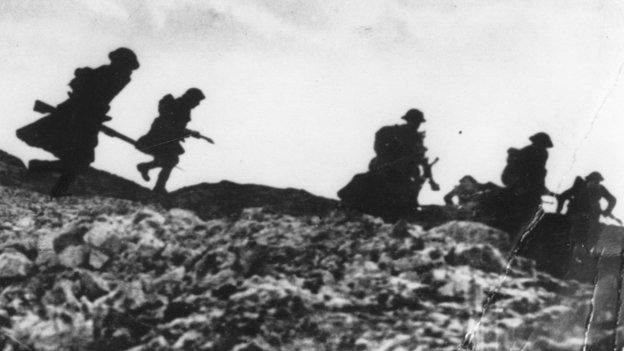Passchendaele 100: Mud and Welsh honours
- Published
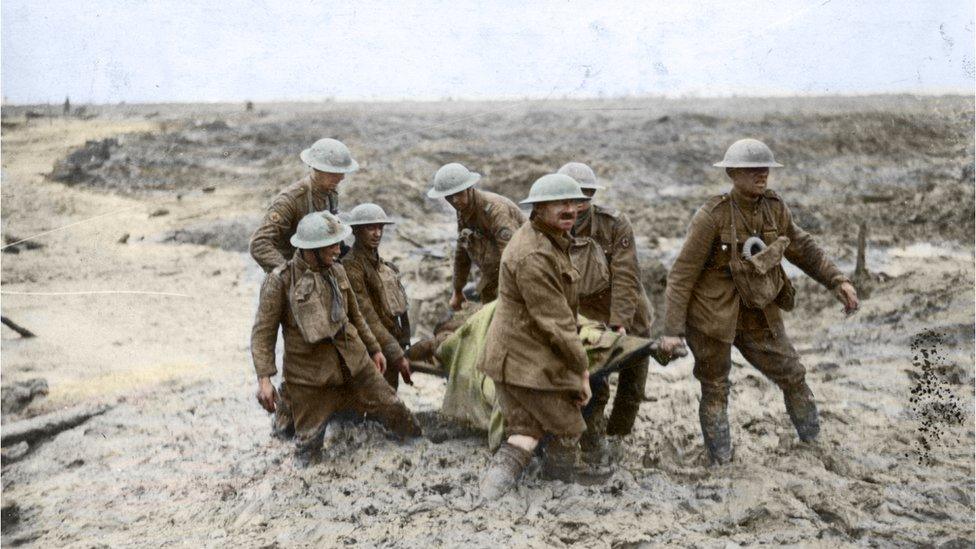
A stretcher party struggles with an injured soldier during the Battle of Passchendaele, in a colourised image
"I died in hell - they called it Passchendaele," wrote the Great War poet and officer in the Royal Welsh Fusiliers, Siegfried Sassoon.
It lasted 103 days, and left an estimated 250,000 British soldiers dead or injured with 400,000 dead, wounded or missing on the German side.
It is claimed that of the one million men killed in World War One, a quarter of them lay in the few square miles around the sleepy Belgium backwater of Ypres.
It was here that the Allied forces dug in deep from 1914 onwards, in a bulge of land known by its military term as the Ypres salient.
It means a location surrounded on three sides by the enemy.
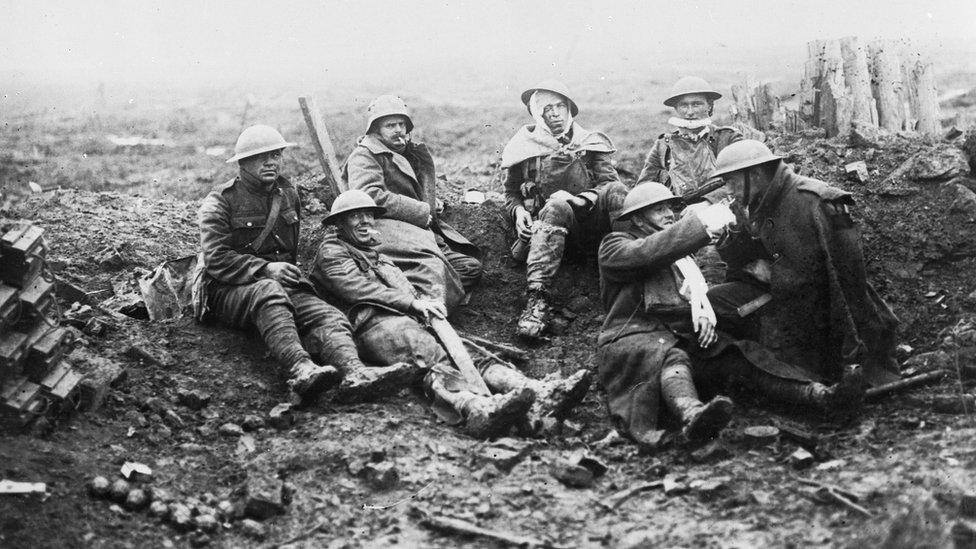
Resting at a dressing station during the battle
It was a stalemate of constant shelling, poison gas attacks, snipers - and most of all mud.
While the German forces occupied the concrete defences on higher ground, the British troops and their allies were forced to make the best of Flanders' fields - cutting trenches into slabs of bog, scurrying, like the rats that shared their makeshift shelters, on duckboards across the mud and shell craters.
The British were determined to break the stalemate, and break out of the Ypres salient.
On 31 July at 03:50, in darkness, the whistles blew and the men of the 38th Division - the Welsh battalions - went over the top.

VC Heroes of the day
The first day of the Battle of Passchendaele saw three Welsh soldiers win Victoria Crosses for their actions - one awarded posthumously.
Cpl James Llewellyn Davies
Passchendaele 100: VC winner 'kept on fighting'
Cpl James Llewellyn Davies, who was originally from Ogmore Vale in Bridgend county, died from wounds sustained during an all out attack on 31 July.
As part of the 13th Battalion, he took part in the Battle for Pilkem Ridge.
His citation, external in the London Gazette reads: "For most conspicuous bravery during an attack on the enemy's line, this non-commissioned officer pushed through our own barrage and single-handed attacked a machine gun emplacement, after several men had been killed in attempting to take it.
"He bayoneted one of the machine gun crew and brought in another man, together with the captured gun.
"Cpl Davies, although wounded, then led a bombing party to the assault of a defended house, and killed a sniper who was harassing his platoon.
"This gallant non-commissioned officer has since died of wounds received during the attack."
He is buried in Canada Farm Cemetery, which was a first aid dressing station in 1917.
Before his death, the father-of-three wrote to his wife Elizabeth, stating: "We are about going over. Don't vex, as I hope to go through it all right, and if I do not you will know that I died for my wife and children and for my King and country."
His widow and their eldest son were presented with the medal in October that year by King George V. The medal is now held on display at the Royal Welch Fusiliers Museum in Caernarfon.
Sgt Ivor Rees
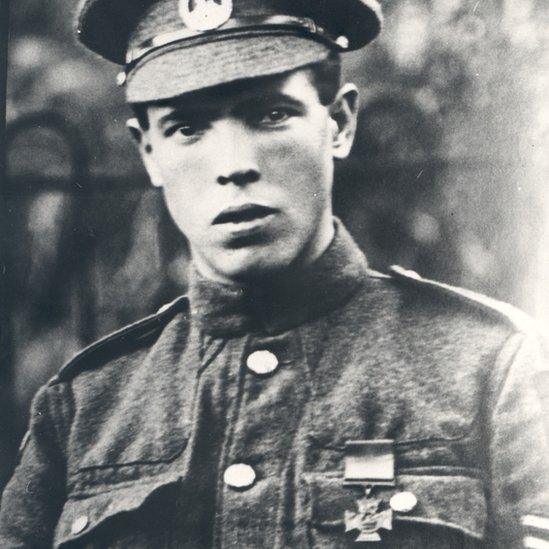
Sgt Ivor Rees was already a survivor of the bloody battle for Mametz Wood
Aged 23 in the summer of 1917, Sgt Ivor Rees from Felinfoel in Carmarthenshire, was already battle hardened when he arrived at the Ypres salient. He had been with the 38th Division at Mametz Wood during the First Battle of the Somme in 1916.
He was with the 11th Battalion, South Wales Borderers, part of the 115th Brigade, which was to form the reserve force in the push to Pilkem Ridge.
By 10:00 they had reached the Steenbeek river, but across the way at a gite the Germans had a reinforced blockhouse and two pillboxes pinning them down.
His citation reads, external: "For most conspicuous bravery in attack. A hostile machine gun opened fire at close range, inflicting many casualties.
"Leading his platoon forward by short rushes, Sjt Rees gradually worked his way round the right flank to the rear of the gun position. When he was about twenty yards from the machine gun he rushed forward towards the team, shot one, and bayoneted another.
"He then bombed the large concrete emplacement, killing five and capturing thirty."
He was promoted to Company Sergeant Major in September, and survived the war to return home to civilian life in Wales, working for Llanelli Borough Council, dying in 1967, aged 73.
A memorial stone to commemorate his bravery is being unveiled in Llanelli on 31 July.
Sgt Robert Bye
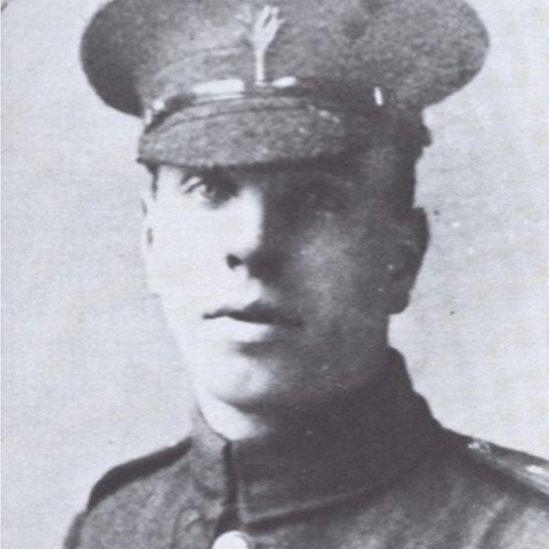
Sgt Robert Bye was the first Welsh Guardsman to be ever awarded the Victoria Cross
Sgt Robert Bye was the first of only two VCs ever won by the Welsh Guards. The regiment was only formed in 1915, and the miner from Penrhiwceiber in the Cynon Valley joined in April of that year.
On the first day of the Battle of Passchendaele the Welsh Guards were part of the 3rd Guards Brigade attack on the left flank.
The force encountered heavy fire from a series of blockhouses hidden in wooded areas, and the 27-year-old slipped from shell hole to shell hole to outflank their positions.
He then put three bombs into the pillboxes to silence the guns. It is estimate he was responsible for the death or capture of 70 German soldiers.
His VC citation reads, external: "For most conspicuous bravery. Sjt Bye displayed the utmost courage and devotion to duty during an attack on the enemy's position.
"Seeing that the leading waves were being troubled by two enemy blockhouses, he, on his own initiative, rushed at one of them and put the garrison out of action.
"He then rejoined his company and went forward to the assault of the second objective. When the troops had gone forward to the attack on the third objective, a party was detailed to clear up a line of blockhouses which had been passed.
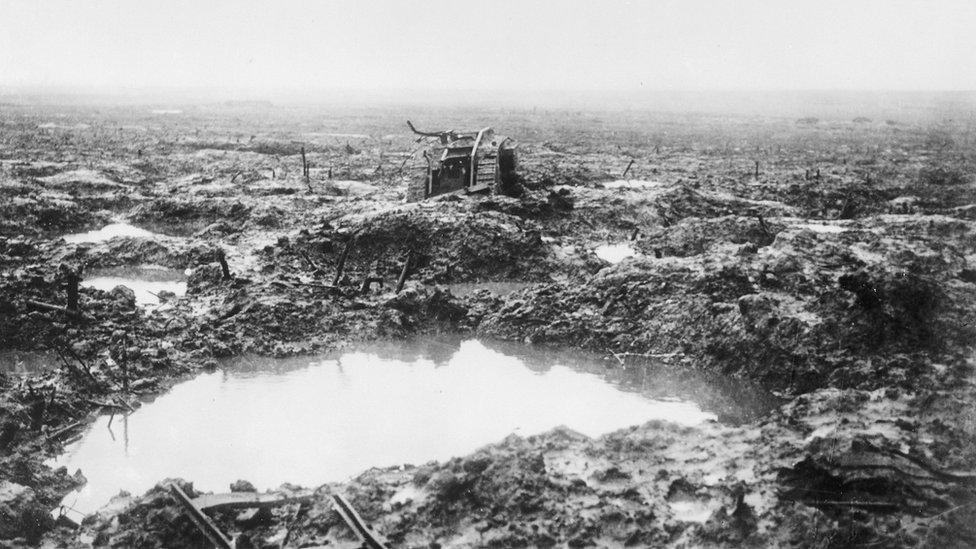
Sgt Bye crawled through shell craters to outflank German positions
"Sjt Bye volunteered to take charge of this party, accomplished his object, and took many prisoners. He subsequently advanced to the third objective, capturing a number of prisoners, thus rendering invaluable assistance to the assaulting companies.
"He displayed throughout the most remarkable initiative."
The soldier survived the war, and later became a Sergeant Major in the Sherwood Foresters, serving in World War Two. He died in 1962.
A memorial service to remember his actions is taking place at the Ynysangharad Memorial Park in Pontypridd, in Rhondda Cynon Taff, at the commemorative paving stone there to his memory.

The Battle of Pilkem Ridge was the opening foray in what became the 3rd Battle of Ypres, or as it is better known - the Battle of Passchendaele.
Within a few short days, the Welsh division had sustained 3,000 casualties and lost hundreds of men.
Among them, the Welsh poet Hedd Wyn - Ellis Humphrey Evans - hit by a shell as the 15th Royal Welsh Fusiliers advanced on a landmark known as Iron Cross.

The battle plan for Pilkem Ridge showing the targets for the Welsh 38th Division
Back home the newspapers boasted, external: "No troops, in fact, in all the battle did their job more thoroughly or with greater dash than the Welsh.
"They had a rather trying time in the trenches before the attack, but it only hardened them and made them keener when the attack took place, and the Germans never had a chance."
But the reality was a short lived victory, with a heavy price to pay.
"The British casualties up to noon yesterday were 25,000," General Sir William Robertson told Prime Minister David Lloyd George at the War Cabinet briefing on 2 August, external.
"We had captured Pilckem Ridge. We had achieved all our objectives and something more on two-thirds of the front, and on the remaining third we had captured the first and second but not the third line."
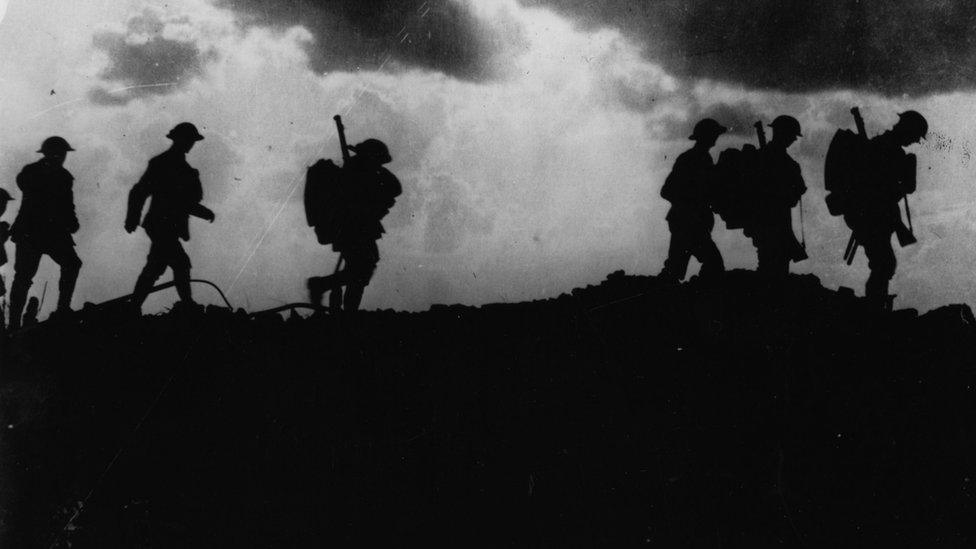
There were counterattacks to come, and the wettest summer in living memory meant the advance faded away.
On 6 August, the 38th Division was relieved from holding the frontline.
But the 3rd Battle of Ypres still had many more battles to fight - and thousands more lives to claim.
- Published31 July 2017
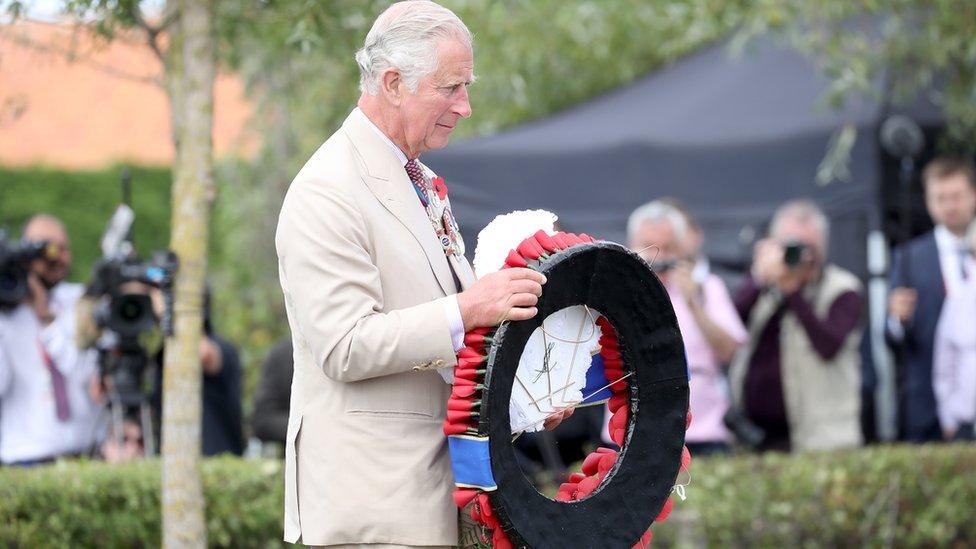
- Published30 July 2017
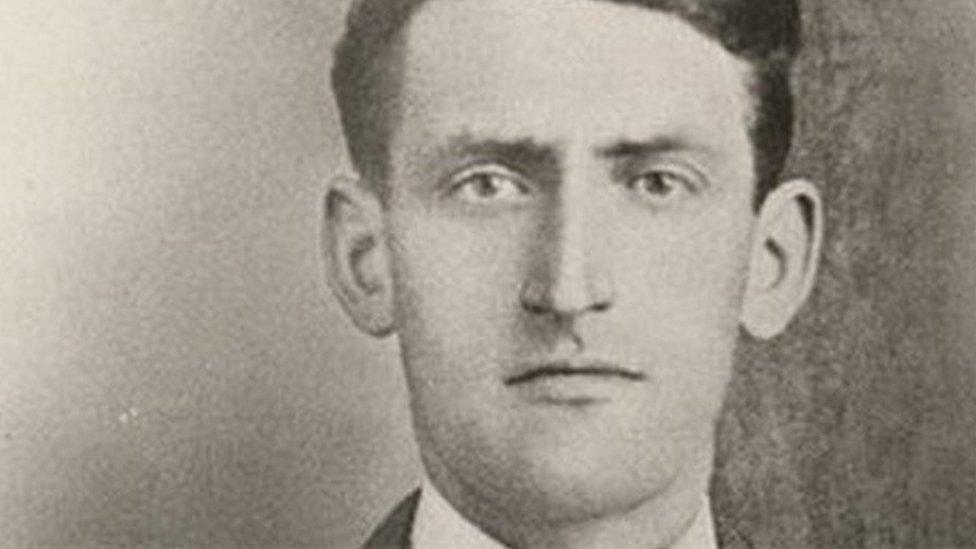
- Published16 August 2014
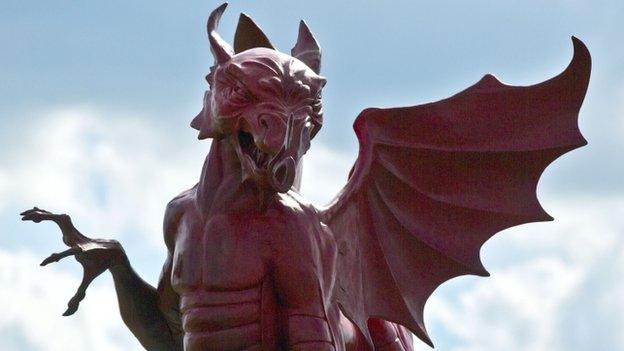
- Published13 February 2013
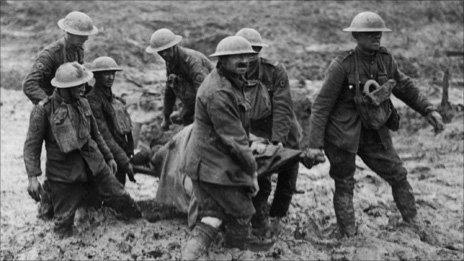
- Published16 June 2016
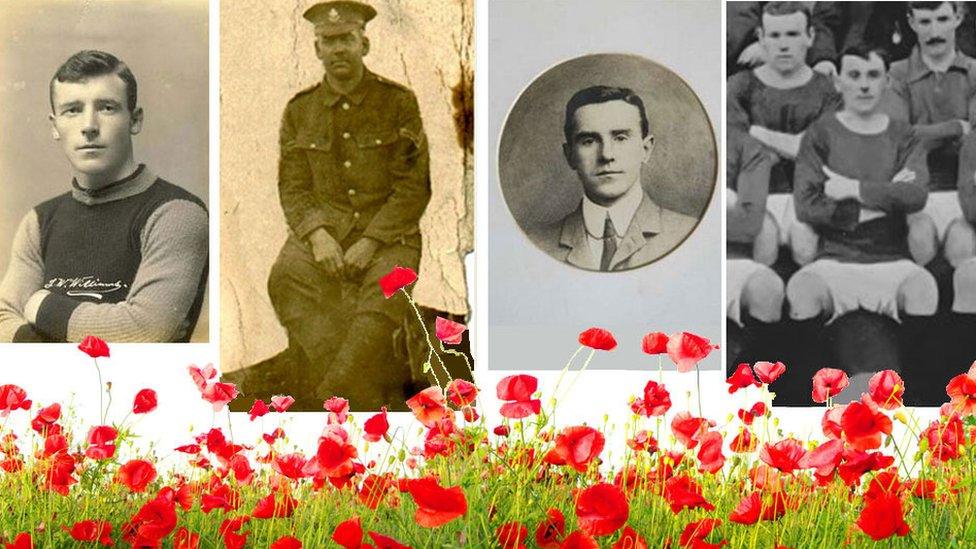
- Published6 August 2014
